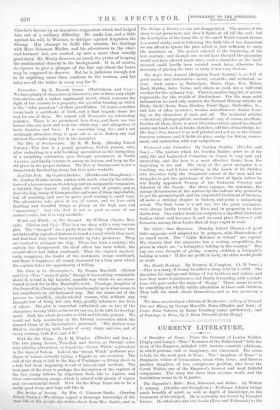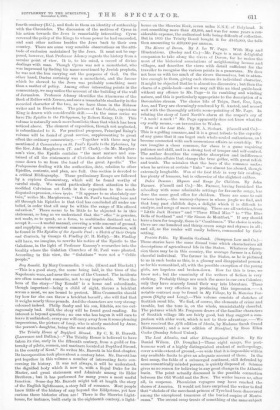The Expositor's Bible; Ezra, Nehemiah, and Esther. By Walter F.
Adeney. (Hodder and Stoughton.)—Professor Adeney brings much breadth of mind, as well as depth of knowledge, to the treatment of his subject. He is evidently not bound by literalist fetters. He attributes the two books (Ezra and Nehemiah) to the
fourth century (B.C.), and finds in them an identity of authorship with the Chronicles. The discussion of the motives of Cyrus in his action towards the Jews is remarkably interesting. Cyrus reversed the policy of the Kings to whose power he had succeeded, and sont other nations besides the Jews back to their own country. There are some very sensible observations on the atti- tude of exclusion maintained by the Jews. It must not be sup- posed, however, that Professor Adoney regards the history from a secular point of view. It is, to his mind, a record of divine dealings with man. Though Cyrus was not a monotheist, who was impressed by finding his name mentioned by Jewish prophets, he was not the less carrying out the purposes of God. On the other hand, Darius certainly was a monotheist, and the favour which ho showed to the Jews was probably something more than a matter of policy. Among other interesting points in the commentary, we may notice the account of the building of the wall of Jerusalem. Professor Adoney identifies the Ahasuerus of the Book of Esther with Xerxes, and sees a remarkable similarity in the recorded character of the two, as we have them in the Hebrew writer and in Herodotus. The picture of the foolish, capricious King is drawn with considerable skill.—In the same series wo have The Epistles to the Philippians, by Robert Rainy, D.D. This volume is naturally much more homiletic than that which has been noticed above. The element of exposition, though not neglected, is subordinated to it. For practical purposes, Principal Rainy's volume will be found of great service, supplementing to great effect the ordinary commentary.—Together with these may be mentioned A Commentary on St. Paul's Epistle to the Ephesians, by the Rev. John Macpherson (T. and T. Clark).—In Mr. Macpher- son's view, the Epistle contains " the most mature and sus- tained of all the statements of Christian doctrine which have come down to us from the hand of the great Apostle." The Prolegomena dealing with the authorities, date, relation to other Epistles, contents, and plan, are full. One section is devoted to a critical Bibliography. These preliminary Essays are followed by a copious Commentary, which will be found worthy of careful study. We would particularly direct attention to the modified Calvinism set forth in the exposition to the much- disputed expression, TIKVa opyi s " It appears to us absolutely cer- tain," writes Mr. Macpherson, " that St. Paul's teaching hero and all through his Epistles is that God has concluded all under un- belief, in order that all may be within the range of His offered salvation." There seems to be little to be objected to in this statement, so long as we understand that the " offer " is genuine, not made, so to speak, as a form, to multitudes destined not to accept it.—A useful manual, covering a wide amount of ground, and supplying a convenient summary of much information, will be found in The Epistles of the Apostle Paul a Sketch of their Origin, and Contents, by George G. Findlay (C. H. Kelly).—Mr. Findlay will have, we imagine, to rewrite his notice of the Epistle to the Galatians, in the light of Professor Ramsay's researches into the locality where the Galatian Churches of St. Paul were planted. According to this view, the " Galatians " were not a "Celtic people."





















































 Previous page
Previous page